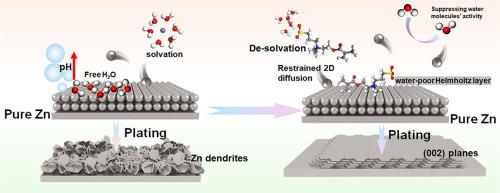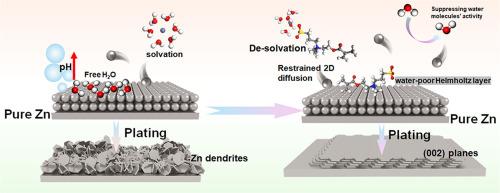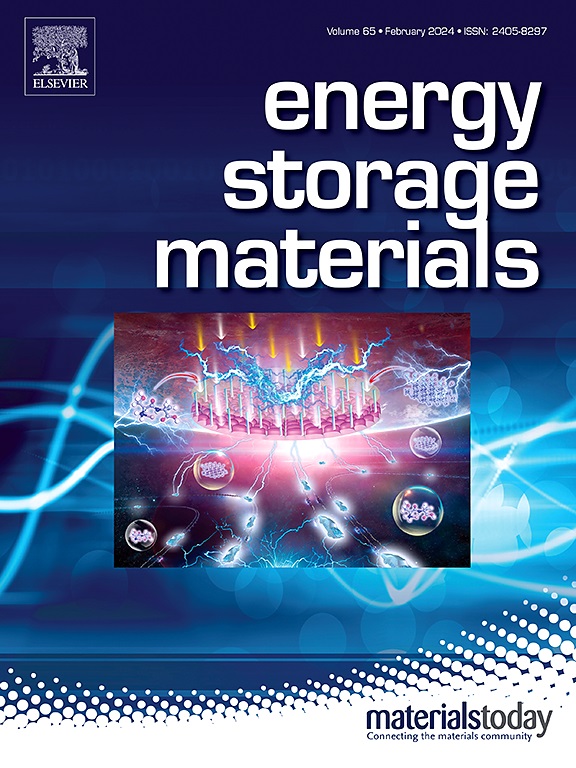弱溶解效应和分子富集层诱导的贫水亥姆霍兹层促进高度稳定的锌阳极
IF 18.9
1区 材料科学
Q1 CHEMISTRY, PHYSICAL
引用次数: 0
摘要
由于水基电解质中水的高活性会导致副反应的发生和枝晶的生长,因此水基锌储能系统的发展遇到了重大挑战。在此,一种名为磺化两性甜菜碱(简称 DMAPS)的齐聚剂添加剂通过弱溶解效应调节 Zn2+ 电解质环境,从而促进高度稳定的 Zn 阳极。DMAPS 链中固有的阴离子(-SO3-)和阳离子(-NR4+)在外加电场的作用下可以有效分离,从而形成不同的离子迁移路径,显著提高电解质离子的迁移能力。此外,DMAPS 还能吸附在 Zn 阳极表面,形成贫 H2O 的赫尔姆霍兹层,作为保护屏障抑制游离 H2O 对 Zn 阳极的腐蚀,并抑制差分电场的形成,促进 Zn2+ 的定向沉积。此外,密度泛函理论(DFT)和分子动力学(MD)进一步证明了 DMAPS 重构 Zn2+ 溶剂鞘结构的内在机制。因此,ZnSO4+DMAPS 溶液中的 Zn//Zn 对称电池可在 1 mA cm-2 和 1 mAh cm-2 的电流密度下稳定循环 2100 小时。使用 ZnSO4+DMAPS 电解质组装的锌离子混合电容器在 5 A g-1 的条件下可稳定循环 20,000 次,容量保持率达 90%。本文章由计算机程序翻译,如有差异,请以英文原文为准。


Weak solvation effects and molecular-rich layers induced water-poor Helmholtz layers boost highly stable Zn anode
The advancement of aqueous Zn-based energy storage systems encounters major challenges due to the occurrence of side reactions and the growth of dendrites caused by the highly active nature of water in the aqueous electrolyte. Herein, a zwitterion additive named sulfonated amphoteric betaine (referred to as DMAPS) regulates the Zn2+ electrolyte environment through a weak solvation effect to promote highly stable Zn anodes. The inherently occurring anionic (-SO3-) and cationic (-NR4+) counterions in the DMAPS chain can be effectively separated under an external electric field to enable the creation of distinct ion migration pathways, thereby significantly enhancing the transportation of electrolyte ions. Moreover, DMAPS can be adsorbed onto the surface of Zn anode to form a H2O-poor Helmholtz layer, which can serve as a protective barrier to suppress corrosion of the Zn anode by free H2O and inhibits the formation of differential electric field to facilitate the directional deposition of Zn2+. In addition, density functional theory (DFT) and molecular dynamics (MD) further assisted in demonstrating the intrinsic mechanism of the reconstruction of the solvated sheath structure of Zn2+ by DMAPS. As a result, the Zn//Zn symmetric cell in ZnSO4+DMAPS solution can be cycled steadily for 2100 h at a current density of 1 mA cm-2 and 1 mAh cm-2. The assembled Zn ion hybrid capacitor with ZnSO4+DMAPS electrolyte was stably cycled for 20,000 cycles with 90% capacity retention at 5 A g-1.
求助全文
通过发布文献求助,成功后即可免费获取论文全文。
去求助
来源期刊

Energy Storage Materials
Materials Science-General Materials Science
CiteScore
33.00
自引率
5.90%
发文量
652
审稿时长
27 days
期刊介绍:
Energy Storage Materials is a global interdisciplinary journal dedicated to sharing scientific and technological advancements in materials and devices for advanced energy storage and related energy conversion, such as in metal-O2 batteries. The journal features comprehensive research articles, including full papers and short communications, as well as authoritative feature articles and reviews by leading experts in the field.
Energy Storage Materials covers a wide range of topics, including the synthesis, fabrication, structure, properties, performance, and technological applications of energy storage materials. Additionally, the journal explores strategies, policies, and developments in the field of energy storage materials and devices for sustainable energy.
Published papers are selected based on their scientific and technological significance, their ability to provide valuable new knowledge, and their relevance to the international research community.
 求助内容:
求助内容: 应助结果提醒方式:
应助结果提醒方式:


